冀教版八年级英语下册unit 5 导学案
- 格式:doc
- 大小:93.00 KB
- 文档页数:6
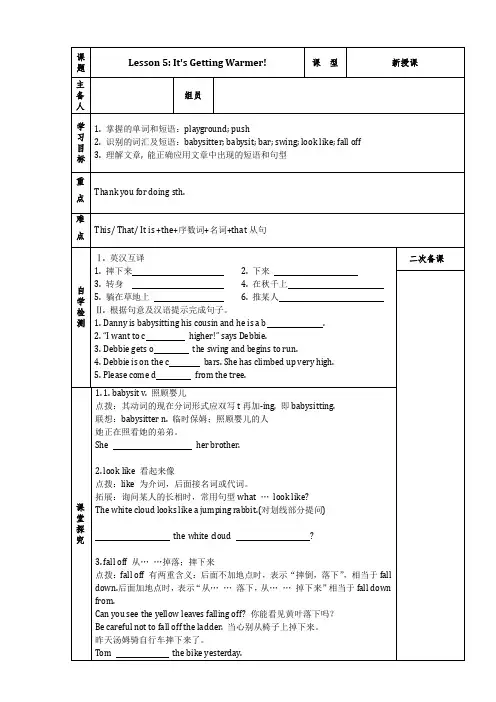
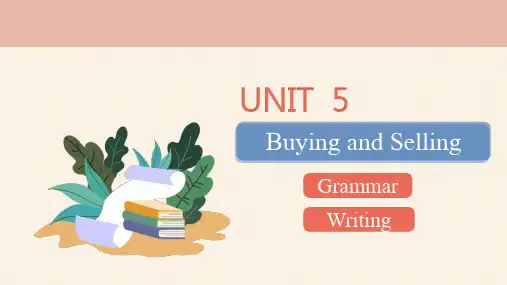
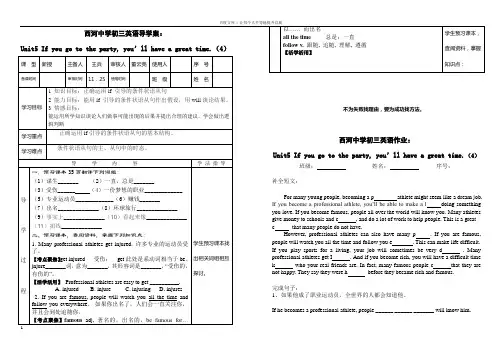
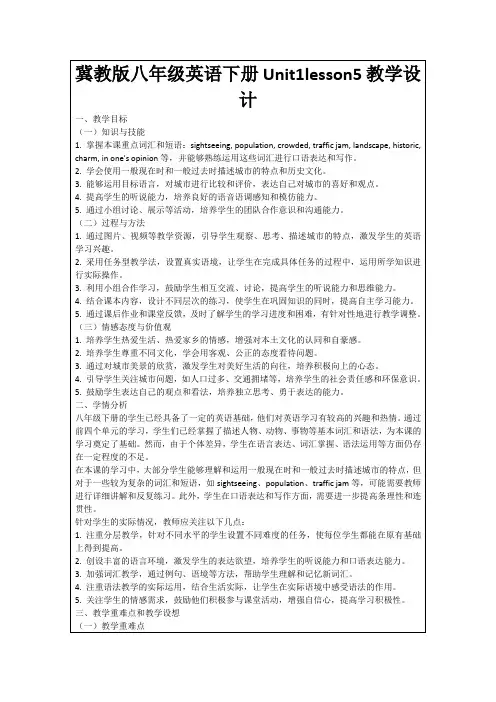
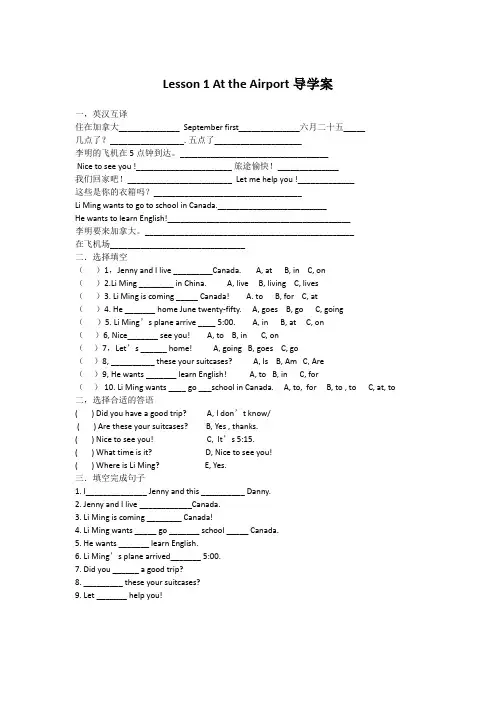
一,英汉互译住在加拿大______________ September first______________六月二十五_____几点了?_________________. 五点了____________________李明的飞机在5点钟到达。
__________________________________Nice to see you !______________________ 旅途愉快!______________我们回家吧!________________________ Let me help you !_____________这些是你的衣箱吗?__________________________________Li Ming wants to go to school in Canada._________________________He wants to learn English!__________________________________________李明要来加拿大。
________________________________________________在飞机场_______________________________二.选择填空()1,Jenny and I live _________Canada. A, at B, in C, on()2.Li Ming ________ in China. A, live B, living C, lives()3. Li Ming is coming _____ Canada! A. to B, for C, at()4. He _______ home June twenty-fifty. A, goes B, go C, going()5. Li Ming’s plane arrive ____ 5:00. A, in B, at C, on()6, Nice_______ see you! A, to B, in C, on()7,Let’s ______ home! A, going B, goes C, go()8, __________ these your suitcases? A, Is B, Am C, Are()9, He wants _______ learn English! A, to B, in C, for() 10. Li Ming wants ____ go ___school in Canada. A, to, for B, to , to C, at, to 二,选择合适的答语( ) Did you have a good trip? A, I don’t know/( ) Are these your suitcases? B, Yes , thanks.( ) Nice to see you! C, It’s 5:15.( ) What time is it? D, Nice to see you!( ) Where is Li Ming? E, Yes.三.填空完成句子1. I______________ Jenny and this __________ Danny.2. Jenny and I live ____________Canada.3. Li Ming is coming ________ Canada!4. Li Ming wants _____ go _______ school _____ Canada.5. He wants _______ learn English.6. Li Ming’s plane arrived_______ 5:00.7. Did you ______ a good trip?8. _________ these your suitcases?9. Let _______ help you!一,背写下列单词浴室____________ 房间____________ 起居室____________ 厨房__________ 二,英语互译:詹妮的房子____________________ 进来__________ in the bedroom___ point to_____________ closet__________ dresser___________在房间里有什么?________________________I’ll show you the rooms in my house __________________________三.选择()1. Help Li Ming point _________ the bed. A, to B, in C, at()2. I’ll show you the rooms _________ my house. A, at B, on C, in ()3. Here _______ my house. A, are B, am C, is()4. What’s _________ the bedroom? A, at B, on C, in()5. Today is September ____________ A, one B, the second C, second ()6. He wants ________ learn English. A, for B, on C, to()7. Li Ming’s plane arrived ________ 5:00. A, at B, in C, on()8, This ________ the kitchen. A, are B, am C, is()9,These __________ bedrooms. A, is B, are C, am三,用合适的单词填空。
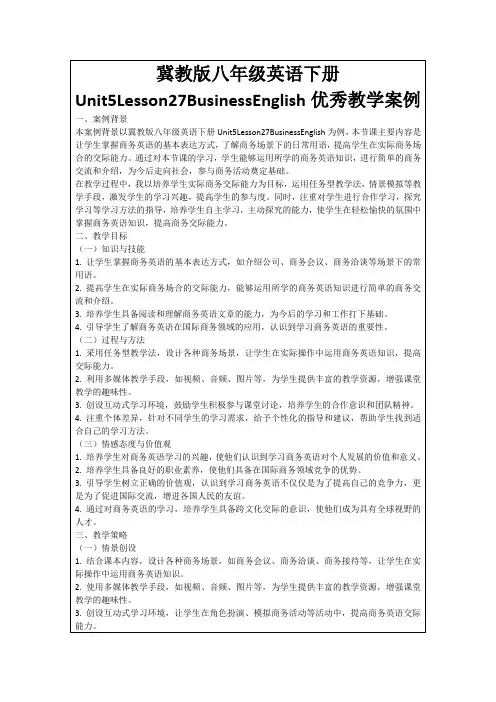
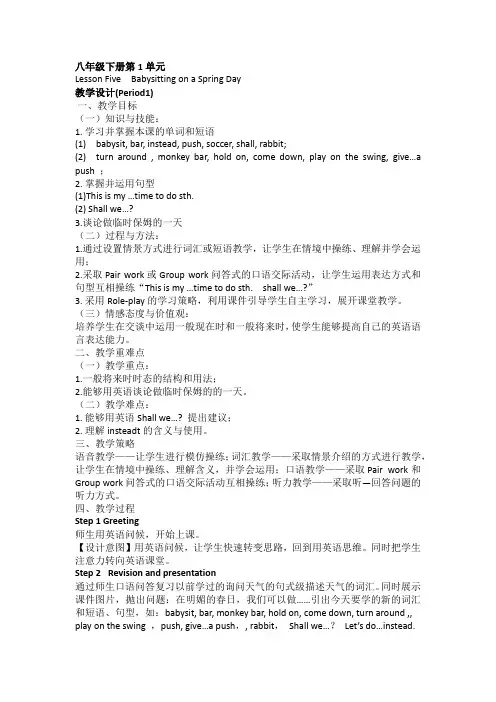
八年级下册第1单元Lesson Five Babysitting on a Spring Day教学设计(Period1)一、教学目标(一)知识与技能:1.学习并掌握本课的单词和短语(1) babysit, bar, instead, push, soccer, shall, rabbit;(2) turn around , monkey bar, hold on, come down, play on the swing, give…a push ;2.掌握并运用句型(1)This is my …time to do sth.(2) Shall we…?3.谈论做临时保姆的一天(二)过程与方法:1.通过设置情景方式进行词汇或短语教学,让学生在情境中操练、理解并学会运用;2.采取Pair work或Group work问答式的口语交际活动,让学生运用表达方式和句型互相操练“This is my …time to do sth. shall we…?”3.采用Role-play的学习策略,利用课件引导学生自主学习,展开课堂教学。
(三)情感态度与价值观:培养学生在交谈中运用一般现在时和一般将来时,使学生能够提高自己的英语语言表达能力。
二、教学重难点(一)教学重点:1.一般将来时时态的结构和用法;2.能够用英语谈论做临时保姆的的一天。
(二)教学难点:1.能够用英语Shall we…? 提出建议;2.理解insteadt的含义与使用。
三、教学策略语音教学——让学生进行模仿操练;词汇教学——采取情景介绍的方式进行教学,让学生在情境中操练、理解含义,并学会运用;口语教学——采取Pair work和Group work问答式的口语交际活动互相操练;听力教学——采取听—回答问题的听力方式。
四、教学过程Step 1 Greeting师生用英语问候,开始上课。
【设计意图】用英语问候,让学生快速转变思路,回到用英语思维。
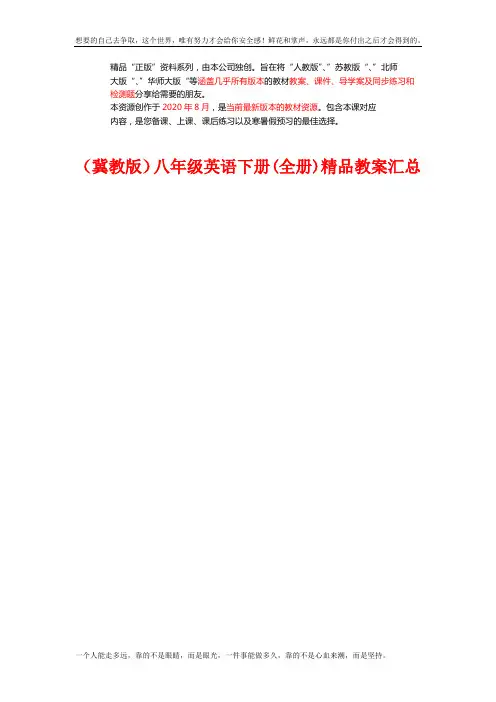
想要的自己去争取,这个世界,唯有努力才会给你安全感!鲜花和掌声,永远都是你付出之后才会得到的。 一个人能走多远,靠的不是眼睛,而是眼光,一件事能做多久,靠的不是心血来潮,而是坚持。 精品“正版”资料系列,由本公司独创。旨在将“人教版”、”苏教版“、”北师 大版“、”华师大版“等涵盖几乎所有版本的教材教案、课件、导学案及同步练习和 检测题分享给需要的朋友。 本资源创作于2020年8月,是当前最新版本的教材资源。包含本课对应 内容,是您备课、上课、课后练习以及寒暑假预习的最佳选择。
(冀教版)八年级英语下册(全册)精品教案汇总 想要的自己去争取,这个世界,唯有努力才会给你安全感!鲜花和掌声,永远都是你付出之后才会得到的。
一个人能走多远,靠的不是眼睛,而是眼光,一件事能做多久,靠的不是心血来潮,而是坚持。 想要的自己去争取,这个世界,唯有努力才会给你安全感!鲜花和掌声,永远都是你付出之后才会得到的。
一个人能走多远,靠的不是眼睛,而是眼光,一件事能做多久,靠的不是心血来潮,而是坚持。 Unit 1 Spring is coming! Lesson 1 How’s the weather?
本节课是冀教版初中英语八年级下册第一单元lesson1,功能话题是谈论天气;文本结构是对话;语法重点是初步认识合成词,并能够运用将来时态预测天气,以及正确使用will写简短的天气预报。因此,在新课标理念、教材内容以及任务型教学法理论的指导下,本节课教学设计如下
【知识与能力目标】 The words and phrases: shower; thunderstorm; thunder; sunrise; sunset; rise; set; exact. 【过程与方法目标】 ①What’s the weather like today? ②What’s the temperature? 【情感态度价值观目标】 Listen, say, read and write.
Unit 5 Lesson 37 Flying Donuts Learning Aims(学习目标) 1.Knowledge Aims(知识目标): fuel燃料 , oil油 、石油 , coal煤 ,think of 认为、想起, at the front of在……前面, with用…… make sb do sth 使某人做某事 2.Ability Aims(能力目标):了解并想象未来的交通方式。 3.Emotion Aims(情感目标): 培养学习英语的兴趣和学好英语的勇气。 Learning Key Points :think of , at the front of,with, make sb do sth , Learning Difficult Points:想象未来的交通方式 自主预习,认真准备 一、重难点再现。 1._______________(在十八世纪六十年代),a scientist in England invented a way to put steam engines and wheels together. 2.What happened ______ the first steam locomotive? A in B to C on D at 3.Thomas Edison was a great ________,he ________ lots of useful _________.(invent) 4.You’d better ________(not talk) in class. 5.The train is running ________ the top speed. A in B to C on D at 6. It’s ___________(danger) to play in the street. A car may hit you. 7. You’ll pass the exam _______________(只要) you work hard. 二、预习检测 1.用本课新单词填空。_______ and ________ are the ________. 2.词形转换。 invent(名词) think(过去式) kind(同义词) make (过去式,过去分词) present(名词) without(反义词) one(序数词) fly(ing形式) inside(反义词) real(副词) hungry(反义词) imagine(名词) 3.英汉互译。 think of 一种新型的…… 作汇报,作演示 on the way home glue …onto … 穿上 turn on 我认为不是这样 玩的开心 预习交流 自主探究,合作交流 一、预习交流 二、探究新知及成果展示 (一)Text learning (课文学习) 1.Listen to the tape and answer the question. What’s Danny’s invention? 2.Read the text answer the following questions ①.How many donuts did Danny buy? ②.What do the donuts do?
③.Will Danny’s invention really work? (二)Language points(语言点) 1.Danny has thought of a new kind of transportation. 用think of ,think about ,think over的适当形式填空。 ①.The teacher can’t _______ _______ his name. ②.He ________too much ________himself. ③.The question is very difficult. You should it ______. 2.Danny is standing at the front of the classroom. 用at the front of,in front of填空。 ①Our English teacher is ________ us.She is standing ________ the classroom. ②Our teacher stands_______ blackboard when we are in the exam.The blackboard is _____the classroom. 3.With my invention, you don’t need an airplane to fly. 说说下列各句中with的意思。 ①We see with our eyes and hear with our ears. ②The teacher came in with a book. ③I go home with her. ④I finished the work with your help. 4.Will other types of food make the rocks go? 选择:( )①This kind of fuel can make it faster. A.go B. to go C.going D.went ( )②Danny makes the blackboard _____. A.to clean B.clean C. cleans D.cleaning 填空:③Rainy days always make me ________(sad) . ④The teacher made Kate_______ (read) the new words five times. ⑤My work and my family make me ________ (happy) all the time. 师生探讨 反馈小结 当堂练习,检测固学 一、自我检测 (一)介词填空。 1.The songs made him think _______ his childhood(童年). 2. Peter helped the old man cross the river his way school. 3. Danny wants to present all of his stamps ______ his friends. 4. Jim passed the exam my help. (二)用所给单词的适当形式填空。 1. He thought of a new kind of _________(transport). 2. Hello, Mr. Black! Can you make your_______( present) to us now? 3. We all had fun _______ (present)our inventions in class. 4. We don’t make the animals __________(mad). (三)根据汉语提示完成下列句子,每空一词。 1.我现在想不起他的名字。I can’t ________ _________ her name at the moment. 2.你喜欢什么类型的音乐?________ __________ _________ music do you like ? 3.杰克想坐在教室的前面听老师讲课。 Jack wants to sit ________ ________ _________ ________ the classroom to listen to the teacher. 4.他没有吃早餐就去上学了。He went to school ________ having breakfast. 5..他们的女儿叫贝贝。Their daughter ______ _________ Beibei. 6..请打开电视,我想看新闻。Please _______ _______ the TV.I want to watch the news. 7.孩子们在儿童节玩的很开心。The children ________ __________ on Children’s Day. 二、应用与拓展 通过查阅书籍、浏览互联网等方式了解未来的交通方式,并用think of ,is called ,with ,first ,then ,fuel等词简单描述自己想象中的交通方式。 学教后记: Lesson 38: Let's Invent Hoverboards 【学习目标】 1.单词:hoverboard, skateboard, transporter, smooth, second, space, spaceship,show 词组短语及句型:all the time, go through, be like, It takes sb some time to do sth 2.情态动词的用法 【学习过程】 自主预习,认真准备: 一、预习早知道: A.写出下列词及短语。 1.two(序数词)________ 2在将来__________ 3.一直,总是__________ 4.从...到...___________ 5.看起来像___________ 6.没有主意____________7.穿越太空_____________ 师生质疑: 自主探究,合作交流 (一)Text learning(课文学习) 1. Listen to the tape and answer the question. What type of transportation would Sam like to see in the future? Read the text answer the following questions What would a hoverboard be like? How long doe it take to fly from Canada to China today? (二)合作探究 1.It takes eleven hours to fly from Canada to China today. ①It took the workers two years ___________(build) the building. ②It ______us twenty minutes to finish _______this book. A. cost; readB. took ; to read C. cost ; reading D. took ; reading 2.It would be great ,wouldn’t it ? (三)讨论:你知道的情态动词有哪些?如何应用?